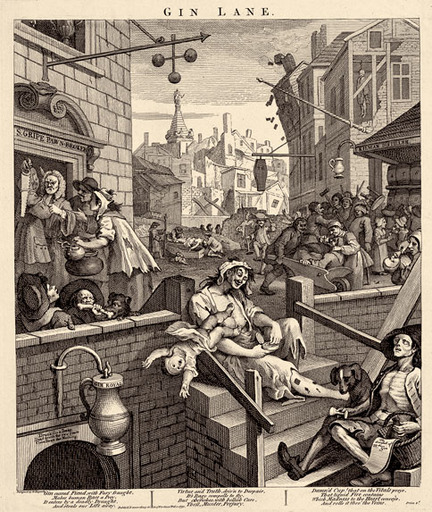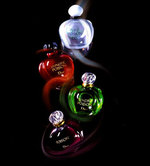Faguenat, Faganat: How The French Described a Host of Stinky Odors after Rabelais with Notes on Fug {Perfume Vocabulary} {Scented Thoughts}

Faguenat, Fagana...Fug
Faguenat, Faganat are two very interesting words as they are all but forgotten in contemporary French, omitted by the contemporary dictionaries I checked, yet have rich, precise and diverse historic meanings in the field of historical olfaction. In this sense, they are revelatory of what the French have classified as meaningful, typically obnoxious smells in the course of their history.
The 9th edition of the Dictionnaire de l'Académie Française does not even mention them today....
Regarding the etymology of the words, nothing is established and there are competing theories. Amongst them, there is the possibility that it would come from Latin Faecatae nates; another possibility is that it comes from "fabaginus" the adjective of "faba" which means broad bean; a third possibility evoked is an origin in Italian "facchino" meaning a lackey; a fourth option is that the word would come from Spanish "fajas" which means a child's onesie; finally, a more modern theory retained by people who know the Lyon dialect is that it would come from the word for French "fouine" and Latin "fagina", or stone marten. The stone marten is reputed to be a carrier of bad smells, its own musky one and that of its decomposing preys.
It is a word that has survived in the Guignol repertory and in the Lyon dialect.
I am not sure that this is an attempt on my part to resuscitate these words, but if that were to happen for expressive, literary reasons, I would be thrilled.
According to a 19th century source, "faguenat" was first coined by Renaissance writer and physician François Rabelais for satirical purposes, as a contraction of two personal names of personalities that apparently Rabelais wanted to roast. Rabelais had a keen nose and would have had to have one as a doctor in an age where the sense of smell was routinely used to establish medical diagnoses. The term was henceforth popularized under the form "faguenas".
The word originally held the very specific meaning of designating the fetid smell of heated excrement as it is exhaled from a crowd of poor people which reveals more than one might wish to know about the difficulty or impossibility of accessing soap, "toilet paper", clean water or even "water closets" that were to be invented much later in these parts of the world.
In a more general sense, it was used to mean the smell of poverty, poor people, or of a sick person, or of the unwashed masses...
Faganat has been recorded as referring to a musty smell, that typically of an old apartment in which the windows are seldom opened. The Guignol dictionary specifies that this characteristic smell has all but disappeared and that it is therefore difficult to describe it.
It is also said to refer to a sickening smell. Someone who is unclean exudes "faganat."
The Dictionnaire étymologique du patois lyonnais defines it as "a flat and particularly stinky smell," adding that it is used to refer to the smell of an unclean woman, by saying that she smells of "farganai". It was also a handy term to use in connection with the displeasure of experiencing foul breath and the same book quotes a sentence in which, interestingly, the idea that smell can be tasted, which is true, is vividly used,
"At the taste of farganat that was exuded by his/her breath, everyone took four steps back."
Finally, in the rural region around Lyon, "faganat" was used to designate a smell not necessarily disagreeable in and of itself but associated with poverty implicitly and peasantry. In the Lyon countryside, "faganat" was a specific body odor, the smell found on the bodies of those that slept on mattresses made of dried beech tree leaves.
We can infer from these examples that as society has been intent on suppressing bad odors more and more, words such as "faguenat" or "faganat" became less characteristic, old-fashioned and survive only as relics. Unpleasant smells still abound but are not at the level that they once were. Now, you have the practical option of covering it immediately with a spritz of deodorizer rather than exclaim "Cela sent le faganat ici!" Moreover the word had a definite class connotation that has lost its power today. One thing is certain is that even if the class connotation associated with bad odors still exists -- take the example of homeless people -- the fact nevertheless remains that perfume has considerably democratized itself since the Renaissance period and especially from the 19th century onwards with the progress of organic chemistry. After that era, you would need a word like "cocotter" to refer to the smell of the excess of perfume, of cheap perfumes in particular, but that is another story for another day.
Picture credit: Gin Lane by Hogarth, Tate, 1751.









Has anyone thought of trying to connect the etymology of these two words with our modern use of the word "fug"?
P.S. Fascinating entry, most enjoyable! Keep up the good work!
Mari,
This is such a great comment! I had not thought about it, but they completely overlap semantically including the more particular sense of an offensive smell in closed quarters, but with the added connotation of a muggy atmosphere.
I looked up some references and some sources indicate that it might come from "fog". But then there is this very interesting word "fogo" which means "stench", "offensive smell" and might be another origin for it. The most promising source I found is a Dictionary of American regional English in which they give several definitions that are very close in meaning to faguenat. The etymology however is different, but it is not impossible still that there was an influence.
And, OMG, yes:
Fogo, also fugo is seen as a NE dialect of English, coming from hogo and possibly influenced by "fog". Hogo would, it is hypothesized, be of French origin as it sounds a lot like "Haut Gout" (lit. High taste, strong taste) and means the same, but influenced by "fog". There is also the semantic field of "vapor". One usage gives it as meaning "breaking wind."
The usage in English appears to be more recent than in French.
Here's an 1840 quote:
"That word...smelt so strong in his nose, he had to take out his handkerchief all scented with musk, to get clear of the fogo of it." Halliburton, Clockmaker.
Thank you very much for pointing out this possible connection.
I'm a total word-nerd, and eagerly absorbed this post. How fascinating! Too bad about losing such an evocative word from the language - we need more smell words, not less!
I so enjoy these historical tidbits you turn up!
Thank you! I think words are very important in revealing the history of a culture and the way people thought about reality.
I also love to research the history of olfactory perceptions and to offer glimpses into it!